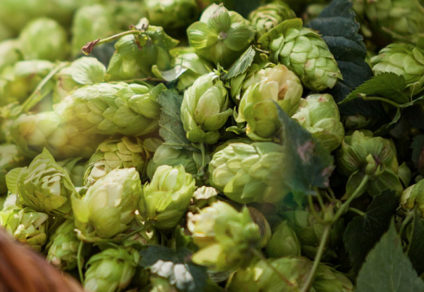
Ingredients
There are many who boast about local products, suppliers, and ingredients, but only a few can speak of it as of a long tradition. There are few industries in which businesses focus on using local, Czech ingredients as much as in the brewing sector.
Protected Geographical Indication Czech beer

This is because using a PGI means making a commitment. It came as no surprise that the very first brand to receive this status was our Gambrinus beer as early as in 2009, followed by Pilsner Urquell, Velkopopovický Kozel, and Radegast. The increased demand for local ingredients has significantly contributed, among other things, to preserving the cultivation and growing of Czech malting barley varieties.
We purchase all barley locally
In Plzeňský Prazdroj we buy all our barley from domestic suppliers. Almost 70 percent is bought directly from the farmers. The remaining 30 percent is bought from traders who guarantee its origin.
We are the second largest purchaser in the Czech Republic and the largest purchaser of varieties approved for products labelled PGI Czech beer. In 2017, we purchased over 148 thousand tons of malting barley, 7 percent more than in the previous year.
Why is Czech barley so important? The local varieties (especially the spring type, two-row barley) allow a lower degree of fermentation, thanks to which Czech beer features a full-bodied taste. This is because it retains more of the original extract. The local barley varieties also contain more polyphenols, which prevent the formation of various undesirable taste-active substances and act as an anti-oxidant.
One condition determining whether a particular barley can be used for malting is the germination capacity of the grain. The barley must also contain a sufficient amount of saccharides. The lower the content, the more barley must be used, which affects taste negatively. At the same time, it should ideally have only about 11 percent proteins. A sufficient content of cellulose facilitates separation of solid grain particles from the wort (lautering).
In fact, barley is rocket science. That is why the requirements placed on the suppliers are quite high and, in order to help, we offer the farmers consultations and seminars. To provide the growers some stability for their business, we conclude with them multi-year contracts for about 1/3 of the purchased volume. We also cooperate with them on the introduction of new varieties.
In 2017, we organized five meetings with Czech barley growers to improve the efficiency of our cooperation and quality of the partnership. During these meetings, we introduced them to the latest trends and exchanged our experience with the help of experts from the Crop Research Institute in Prague, the Brewing and Malting Research Institute in Brno, Mendel University in Brno, and several breeding associations. In total, more than 350 representatives from our suppliers participated in these activities.
![str.15-Suroviny_1[1]](https://www.prazdroj.cz/cospospohzeg/uploads/2018/06/str.15-Suroviny_11-424x283.jpg)
Czech hops is a world-famous term
Its most well-known varieties – Sládek and Saaz semi-early red-bine hops or Saaz late play a key part in our beer production in Pilsen, Nošovice, and Velké Popovice.
The hop pellets used in making our beers are made by crushing the cones immediately after harvesting without access to air. This allows the ingredient to keep its intense bitterness and unique aroma and eliminates the need to use anti-mould treatments. In exceptional cases, we use the cones – for example, to make a special brew called Gambrinus First Hops.
What makes Czech hops so unique? Thanks to specific soil and climatic conditions, they possess exceptional flavour and aroma qualities which make them the world’s most recognized hops. Their favourable percentage of so-called alpha-acids makes them suitable for direct hopping.
The majority of our hop supplies is sourced locally, but as we also produce specialty beers, flavoured beers and other beverages for whose production certain foreign hop varieties are more suitable, we purchase small volumes of hops from abroad (for example, to make our Excelent Ice Beer, to which a percentage of the Sorachi Ace variety of hops lends its subtle citrus aroma).
In 2017, we supported the local Brewing and Malting Research Institute in its research activities, for example, in the area of new varieties of Czech hops, barley, and the brewing qualities of the main substances and compounds contained in them. This support totalled CZK 1,950,000.

Beer may only be brewed from water you would enjoy drinking
Few would doubt its importance for the final taste. When Baron Franz Ringhoffer was looking for a place to build a new brewery, the very reason he chose Velké Popovice was the quality of the water there.
Similarly, the reason why the experts selected Nošovice for the construction of a new plant in the 1960s was the proximity of the Morávka river (nowadays, the brewery uses its own wells and the municipal supply of drinking water). In Pilsen, the wells are famous for their soft water, lending the beer its mildness.
Of course, this water goes through checks or treatment, as needed, in the breweries. It is important to know that more water is used than the amount that finally ends up in the beer – for details on what we do to preserve this ever more precious liquid, see the section headlined “We have reduced water consumption by one-third since 2010.”
![str.6-slovo-GR_udrzitelnost_1[1]](https://www.prazdroj.cz/cospospohzeg/uploads/2018/06/str.6-slovo-GR_udrzitelnost_11-424x292.jpg)